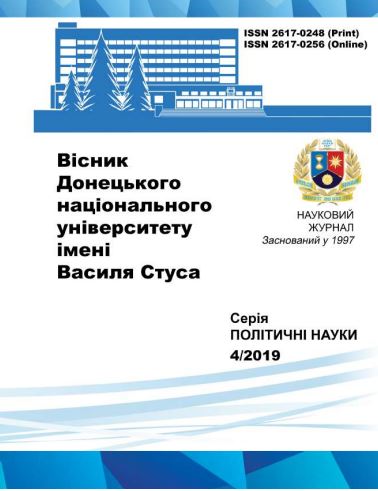Unitarism as a Political and Legal Phenomenon: Domestic and Foreign Experience.
DOI:
https://doi.org/10.31558/2617-0248.2019.4.3Keywords:
unitarism, territory, state, state structure, state border, administrative-territorial structure, the function of the territoryAbstract
The article reveals the essential and substantial characteristics of unitarism as a phenomenon of modern constitutional law. It is shown that a synergistic relationship between the principles of the national territory is unitary and fundamental political and legal institutions, and public-administrative life of the modern unitary states. It is proved that a unitary device is not only an important component of the process of achieving goals, objectives and functions of the majority of modern states, but also a sign of an immanent and strategic element of the implementation mechanism of their sovereign rights.
The current stage of constitutional construction in Ukraine is characterized by an intense search for fundamentally new solutions on the path of radical restructuring of all aspects of state and society. One of the pressing and complex problems that have arisen since the independence of the Ukrainian state is the issue of improving the territorial organization of power and the territorial structure of Ukraine. After all, the territorial system is one of the most important institutions of the state system of Ukraine. This institute characterizes the legal qualities and properties of such a basic component of the state as its territory. The territorial structure isthe organization of the territory of the state. Territory is a prerequisite for the development of all state life, forming, along with the categories of «people» and «power», a triad of elements that form the state.
The complexity, importance, and relatively widespread use of unitarity as a form of government is causing a lively and ever-growing scientific interest in it throughout the world. The unique ability of unitarism to take into account the specific features of a particular state allows it to manifest itself in each case in a new way. That is why it is important to analyze the mutual influence of unitary theory and practice, to explore and take into account the peculiarities of national unitarism.
The problem of unitarism and the unitary form of the territorial structure of the state and the status of its constituents is one of the least studied in domestic constitutional law. Modern representatives of the science of constitutional law, as a rule, are limited to consideration of individual issues of the territory, in particular, the peculiarities of the territorial organization of state power and local self-government, problems of state sovereignty, territorial integrity and inviolability, etc. To a large extent, the lack of study of the problem in contemporary Ukraine causes difficulties in the common understanding of phenomena such as unitarism, federalism and federalization, regionalism and regionalization, decentralization and deconcentration, etc. It should be noted that in the contemporary literature on the issues of the state territory, territorial organization of state power and other issues of the status of the territory, the complex, multidimensional nature of unitarism as a constitutional category is not always taken into account.
In the context of the study, considerable attention is also given to the problems of establishing and developing a constitutional model of public authority organization in Ukraine in terms of the principles of subsidiarity and decentralization.

